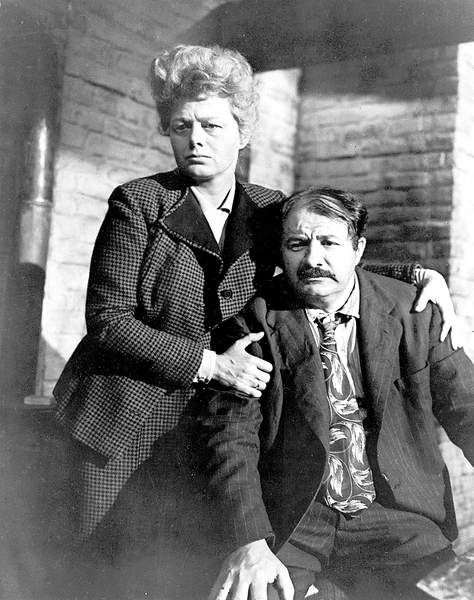Actor Lou Jacobi played comic and dramatic roles
Published 5:00 am Monday, October 26, 2009

- Actors Shelley Winters, left, and Lou Jacobi are seen in the movie “The Diary of Anne Frank.” Jacobi, a longtime character actor, has died at the age of 95.
NEW YORK — Lou Jacobi, the mustachioed, scene-stealing Canadian-born actor and comedian who made a film and stage career playing comic ethnic characters but was lauded for serious dramatic roles as well, died Friday at his home in Manhattan. He was 95.
The death was confirmed by Leonie Nowitz, a social worker and care manager.
Jacobi made his Broadway debut in 1955 in “The Diary of Anne Frank,” playing a less-than-noble occupant of the Amsterdam attic where the Franks were hiding, and reprised the role in the 1959 film version. When Bosley Crowther, reviewing the movie in The New York Times, described Jacobi as “irksomely sluggish and pathetically lax as the weakling Van Daan,” it was high praise.
As his career continued in New York and Hollywood, spanning five decades, Jacobi became accustomed to favorable reviews, mostly in comic roles and often when the film or play itself was less than warmly received.
‘A very funny actor’
When he starred in the short-lived Broadway comedy “Norman, Is That You?” in 1970, Clive Barnes of The Times did not care for the play, but took time to wax rhapsodic about Jacobi and his character. “Mr. Jacobi is a very funny actor who hardly needs lines to make his point,” Barnes wrote. He added: “He has a face of sublime weariness and the manner of a man who has seen everything, done nothing and is now only worried about his heartburn.”
The 10 Broadway plays Jacobi appeared in also included Paddy Chayefsky’s “Tenth Man” (1959); Woody Allen’s “Don’t Drink the Water” (1966); and Neil Simon’s “Come Blow Your Horn” (1961), in which he portrayed the playboy protagonist’s disappointed father. His reading of the line “Aha!” stuck with the Times columnist William Safire so vividly that he cited it when writing about the meaning of the word 36 years later.
Jacobi also made two dozen feature films. His supporting roles included the philosophical bartender in “Irma La Douce” (1963), the young hero’s unsophisticated uncle in “My Favorite Year” (1982), a lucky florist in the Dudley Moore comedy “Arthur” (1981) and a middle-aged transvestite who gets caught with his hostess’ clothes on in “Everything You Always Wanted to Know About Sex” (1972). In Barry Levinson’s “Avalon” (1990), he played a dramatic role, one of four Russian brothers trying to build a future in Baltimore in the early 20th century.
Louis Harold Jacobovitch was born on Dec. 28, 1913, in Toronto. He began acting as a boy, making his stage debut in 1924 at a Toronto theater, playing a violin prodigy in “The Rabbi and the Priest.” He did play the violin, then and for most of his life.
Stage and film
After working as the drama director of a Toronto YMHA, the social director at a summer resort, a stand-up comic in Canada’s equivalent of the Borscht Belt, and the entertainment at various weddings and bachelor parties, Jacobi tried his luck in London. There he appeared in shows including the American musicals “Guys and Dolls” and “Pal Joey,” and was part of a command performance at the London Palladium in 1952.
He made his film debut in “Is Your Honeymoon Really Necessary?” (1953), a black-and-white British comedy with the country’s blond sex symbol of the moment, Diana Dors. In the United States, he began making guest appearances on a variety of television series, ranging from “Playhouse 90” to “The Man From UNCLE” to “That Girl,” and continued to appear on series and in television movies until he was in his late 70s.
In the summer of 1976, he was the star of a CBS comedy series, “Ivan the Terrible,” in which he played a Russian headwaiter living with nine other people in a small Moscow apartment. He was a regular on “The Dean Martin Show” on NBC for two seasons in the early 1970s.
Jacobi also made successful comedy recordings with titles like “Al Tijuana and His Jewish Brass” and “The Yiddish Are Coming! The Yiddish Are Coming!”
In his last film, “I.Q.” (1994), he played the logician Kurt Godel, one of Albert Einstein’s professor friends at Princeton. His last Broadway play was “Cheaters,” a 1978 comedy about two adulterous middle-aged couples.
But he continued to do theater elsewhere. When he appeared in a 1988 Connecticut production of Clifford Odets’ “Rocket to the Moon,” at the age of 74, his reviews were as positive as ever.
Jacobi married Ruth Ludwin in 1957. She died in 2004. He is survived by a brother, Avrom Jacobovitch, and a sister, Rae Gold, both of Toronto.
“As you make your way through life, sometimes you happen upon people who know how to be happy,” the film critic Roger Ebert wrote in The Chicago Sun-Times in 1999. He was interviewing Jacobi on the occasion of the dedication of his star on Canada’s Walk of Fame. “I look at Lou, and I’m not afraid to be 85, if I can get there in Lou’s style.”








